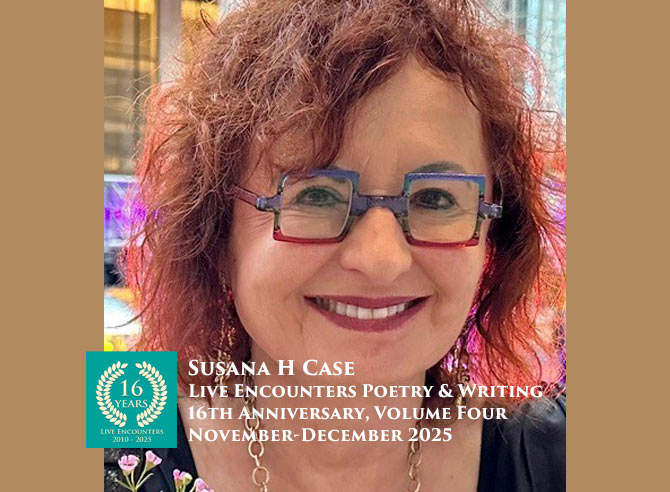
Live Encounters Poetry & Writing 16th Anniversary Volume Four
November- December 2025
Erasure, poems by Susana H Case.
Guérewol
The men drink fermented bark juice—
hallucinogenic—while they line dance,
in ostrich feathers and beads, sing,
for a week, sometimes, under the blazing
sun, manic in black lipstick
and face paint, a vertical stripe down each face.
I am a woman not given to grace of movement.
How elegant, in contrast, is the man
in a striped red and blue tunic,
one of the contestants. How easy to know
who will make a good catch, a second
love match after the first arranged marriage,
when this is the standard of beauty:
even white teeth, clear eyes, height.
The standard for men that is—at a pageant
judged by Wodaabe women, a jury of three
who choose the most attractive man
from among men who are given mirrors
at birth, who have to mimic the movement
and stance of the agile white egret.
Erasure
The taxi driver points: here it is, look—
the largest slum in Nairobi,
the largest in Africa—
as if it must be written
in the book of our knowing.
Earlier, the travel agent claimed never
to have heard of Kibera.
One million people compressed
onto an unauthorized settlement
the size of New York’s Central Park.
Unlike in Brazilian favelas,
few tourists wander Kibera,
though curiosity has a way of arriving—
cameras intrude into alleys.
A house is a mud-walled box
with metal roof, twelve-by-twelve feet;
eight bodies or more breathe
the same air. Soot from open fires
clings to hair and skin.
Little relief on the streets,
which pool with dirty water
from the Ngong River. Garbage
piles high. One outdoor latrine
for every fifty shacks.
Plastic bags of excrement—
flying toilets—scatter
across rooftops and drainage ditches.
Residents sit and gulp methanol,
wood alcohol, an industrial solvent.
Life expectancy—thirty years.
The government owns the land,
sells leases to landlords, withholds
services to the visible invisible.
Kibera, originally Kibra, means forest.
Closing the Distance
Maasai feet have few ailments,
a little curling of the toes. Barefoot,
or in sandals made from tires,
they might walk their cattle
more than thirty miles a day. Their boma,
huts of mud and dung, illegal
now near Ngorongoro grassland—
thousands pushed off ancestral land
to protect the terrain.
No—they bring in oil sheiks to shoot
big game, the Maasai say, drinking water
blocked, zebu cattle starved.
Security forces fire bullets,
tear gas. A tribesman kills
a policeman with an arrow. Local
leaders go to prison. I go to see
the wildebeest, elephants, but
what stays is when wandering
on the plains, looking for animals,
a tall and thin Maasai in a red sheet
walks by. He has an old Kodak plastic
canister in the stretched piercing
of his earlobe—for snuff, he gestures.
I hand him binoculars, pantomime
what to do, and he gasps as the distance
enlarges through the lenses, at everything
about the world’s closeness.

